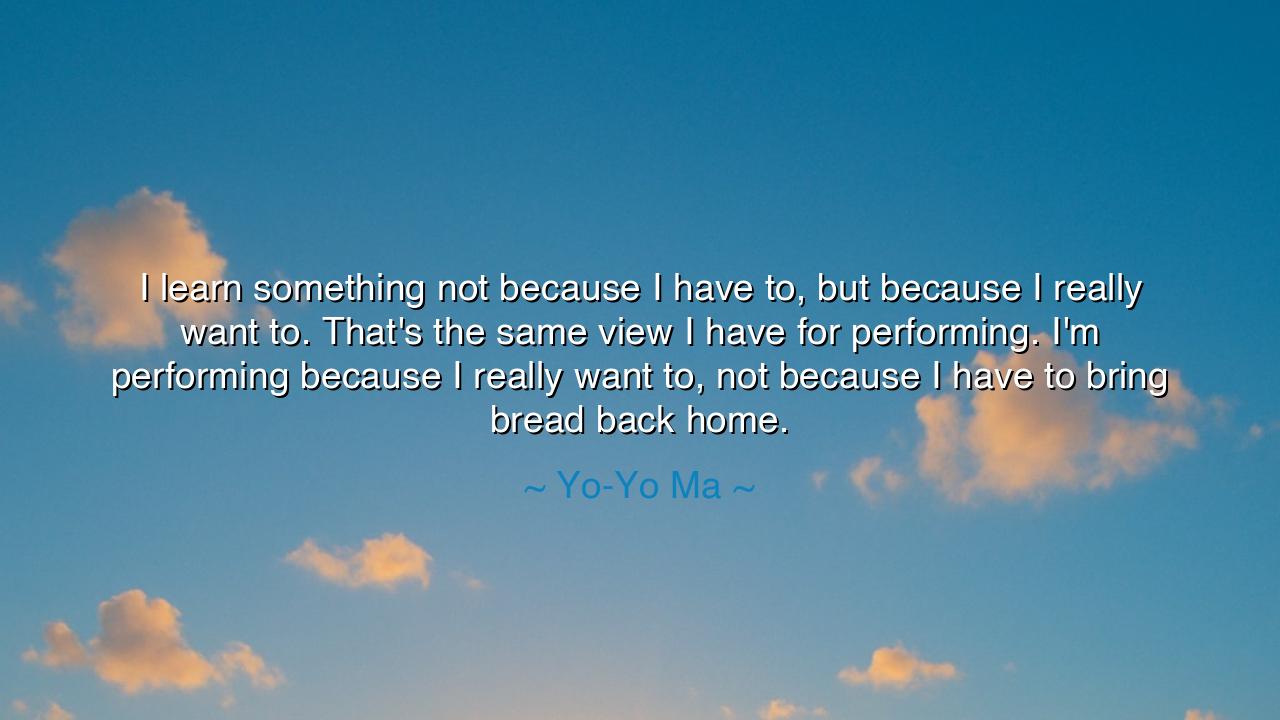
I learn something not because I have to, but because I really
I learn something not because I have to, but because I really want to. That's the same view I have for performing. I'm performing because I really want to, not because I have to bring bread back home.






The master cellist Yo-Yo Ma, a musician whose art has touched hearts across the world, once said: “I learn something not because I have to, but because I really want to. That’s the same view I have for performing. I’m performing because I really want to, not because I have to bring bread back home.” In these humble yet luminous words lies a truth as old as civilization itself — that true mastery is born not of necessity, but of love. The spirit of creation, learning, and performance becomes divine only when it springs from joy and not compulsion. Ma reminds us that when passion guides the hand, the work transcends its purpose and becomes an offering — not to survive, but to express the fullness of being alive.
Since the dawn of time, the wisest among humankind have known that the soul grows not through duty, but through desire born of wonder. The ancient philosophers of Greece spoke of learning as the highest act of freedom — a pursuit undertaken not for gain, but for the sheer delight of understanding the world. Likewise, Yo-Yo Ma speaks with the voice of the artist-philosopher, one who learns and performs because it brings him closer to truth. His music is not a tool for survival; it is a language of gratitude, a communion between himself and the universe. Through this, he becomes not merely a performer, but a seeker — one who finds meaning through curiosity and love.
When Ma says, “I learn because I want to,” he stands against one of the great illusions of modern life — the belief that knowledge and work are valuable only when they serve profit. He reminds us that learning for its own sake is one of the purest joys the human spirit can know. Just as a child picks up a seashell simply to marvel at its shape, so too does the artist study sound, form, and expression — not for fame or bread, but for the wonder of discovery. The great Leonardo da Vinci, whose curiosity knew no bounds, lived by the same truth. He studied the flight of birds, the movement of water, and the anatomy of the human body not because he was told to, but because he hungered to know. His genius flowed from desire, not obligation — the same current that moves through Yo-Yo Ma’s music.
The origin of Ma’s quote lies in his lifelong devotion to learning and his reverence for creativity. A child prodigy, he could have easily been consumed by ambition or the pressures of expectation. Yet throughout his life, he has returned again and again to the simplicity of joy — the pure act of learning and playing for love alone. Whether performing in grand concert halls or small classrooms, he holds the same reverence for the music. In every note, there is gratitude; in every phrase, a reminder that art is sacred when it is free from fear. His philosophy is a return to innocence — the kind of wholehearted devotion that all great masters rediscover after long years of striving.
This way of life is not limited to the artist or musician; it belongs to all who labor with passion. To work for necessity alone is to live half a life. But to work out of love and curiosity is to live twice — once in the act, and again in the joy it brings. The Japanese artisans of old, for instance, would spend their entire lives perfecting a single craft — a tea bowl, a brushstroke, a garden stone — not for profit, but because the act itself brought them peace. They understood what Yo-Yo Ma teaches: that excellence is not achieved through obligation, but through devotion.
Yet, there is another truth hidden in Ma’s words — the call to gratitude and humility. To perform “not because I have to bring bread back home” is to recognize one’s blessings and use them to honor the gift of life itself. It is to say: I do this not out of fear, but out of joy; not out of survival, but out of love. Such a mindset transforms the mundane into the sacred. The same act — whether playing a cello, teaching a child, or tending a garden — becomes radiant when done with heart. For when love fuels action, the result is not merely success, but meaning.
The lesson, then, is this: do not let necessity be your only master. Let curiosity, wonder, and love be the hands that guide you. Learn not because you must, but because you long to understand. Work not because you are forced, but because you are called. When duty and delight become one, life itself becomes art. Begin each task with gratitude, as Yo-Yo Ma does, and you will find that even the smallest act — a note, a gesture, a word — can echo with eternity.
Thus, Yo-Yo Ma’s words carry the wisdom of the ancients: that true fulfillment arises when passion replaces obligation, and joy becomes the measure of our work. He teaches that the path to mastery is not through struggle alone, but through love of learning and reverence for creation. So live as the artist lives — not merely to earn your bread, but to nourish your soul. For when your hands move with purpose and your heart beats with joy, every act becomes music, and every moment becomes a song worth playing.






AAdministratorAdministrator
Welcome, honored guests. Please leave a comment, we will respond soon